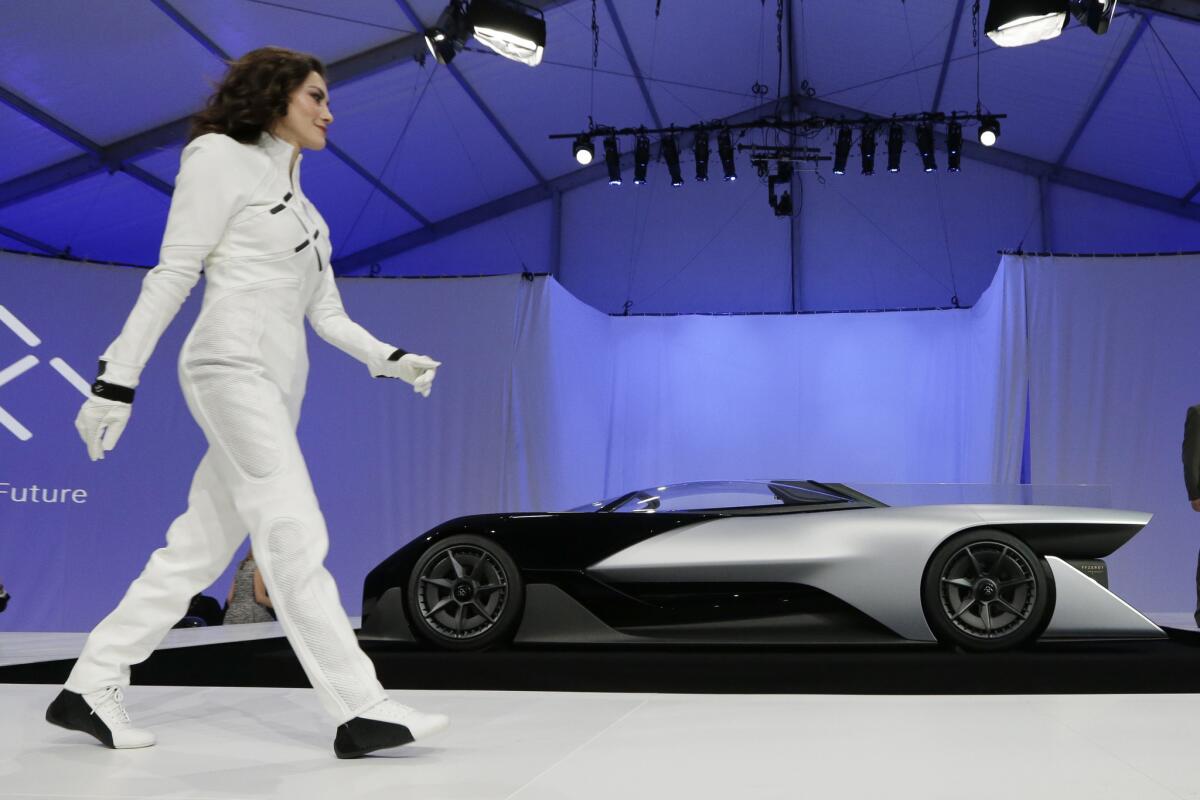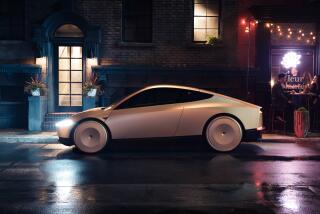Carmakers show off tech innovations at CES

Faraday Future, a fresh-out-of-the-gate Gardena automaker, reveals its hotly anticipated electric concept car, the Batmobile-esque FFZERO1, during a news conference at CES in Las Vegas.
LAS VEGAS — Speed and cars go hand in hand, whether you’re talking acceleration, tight turns in the corners or how high the speedometer will go.
Speed and car companies? Not so much.
Tired of being cast as stodgy behemoths, a dozen of the world’s largest automakers have descended upon CES, turning the annual consumer electronics convention into practically an auto show of sorts. The car brands say they’re taking cues from pure tech companies on what it takes to go faster: faster to innovate, faster to change, faster to bring new products to market.
Faraday Future, a fresh-out-of-the-gate Gardena automaker, is leading that drive. The company — already being labeled a major Tesla rival in the making — used CES to reveal its hotly anticipated electric concept car, the Batmobile-esque FFZERO1. Faraday plans to bring a more approachable production vehicle to consumers in the next couple of years, a short timeline for a company that was formed just 18 months ago.
“We must anticipate the future and act upon it with speed, decisiveness and a willingness to be more like a technology company rather than an automotive company,” Nick Sampson, Faraday’s senior vice president of research and development and product development, said at the company’s unveiling event Monday night.
Sampson, who previously worked at Tesla Motors, elaborated further during an interview with The Times on Wednesday.
“With consumer electronics, there’s [always] new stuff coming out. It’s bang bang bang — it’s new, it’s better — whereas the car industry moves a lot more slowly,” he said at Faraday’s booth in the Las Vegas Convention Center.
“They’re like a supertanker — they just take so long to change direction, where we’re looking to be more nimble and fast.”
More established car companies, after decades of resisting major change, are echoing that sentiment, acknowledging that they would benefit from leaving behind the slow-to-change ways of Detroit in favor of the bold thinking and rapid advances characteristic of Silicon Valley. Instead of comparing themselves to one another, they’re looking to Apple, Google, Facebook and start-ups for inspiration as they push for a future where connected cars double as rolling entertainment hubs and, eventually, drive themselves.
“Today, the pace accelerates even more,” General Motors Chief Executive Mary Barra said Wednesday during her keynote address. “I have no doubt the auto industry will change more in the next five to 10 years than it has in the last 50.”
Moments later, she introduced the 2017 Chevrolet Bolt EV, an electric vehicle with a more than 200-mile range that will cost about $30,000 after government incentives. In describing the new vehicle, Barra said it was more than just a car — “it’s an upgradable platform for new technologies.”
Other auto brands drew similar tech comparisons. Volkswagen introduced its electric e-Golf Touch car as a “smartphone on wheels.” Faraday’s head designer, Richard Kim, said the FFZERO1 was “an extreme tablet on wheels.”
Changing consumer preferences are forcing the upheaval.
Last year, nearly two-thirds of consumers said they would switch car brands to get a vehicle with all the technological upgrades they wanted, an increase of 9 percentage points from 2014, according to data released at CES by Autotrader. And 77% of respondents said they prioritized technology over car color, an 8-percentage-point bump.
Features such as collision avoidance, backup cameras and adaptive cruise control “are now considered to be standard must-haves,” said Rachelle Petusky, a research analyst at Autotrader.
To entice fickle customers, automakers say they’re rethinking the business on all fronts: by redesigning cars with technology front and center, shaking up staid corporate culture and working closely with tech companies.
Barra pointed out that GM has formed a strategic alliance with ride-sharing company Lyft to create a network of on-demand autonomous vehicles and has partnered with tech company Mobileye to help enable autonomous driving. The automaker also meets “frequently” with senior leaders at Facebook.
During its news conference, Toyota didn’t even show off a new vehicle. Instead, the company devoted its 25 minutes to discussing its new Toyota Research Institute, a collaborative research partnership with Stanford and MIT announced last year to delve into artificial intelligence and robotics. One of its aims will be enhancing the safety of automobiles with the ultimate goal of creating a car that is incapable of causing a crash.
It’s a big year for car and car-related technology at CES. All told, automakers and automotive tech companies are taking up 200,000 square feet of exhibit space, up from 150,000 square feet last year and making it the largest showing ever for the group.
After months of secrecy, Faraday decided to have its coming-out event at CES instead of at the North American International Auto Show in Detroit next week precisely to show its allegiance to the tech community and its start-up way of thinking, executives said.
“We chose here because we believe that it emphasizes the point: We’re not an auto company,” Sampson said. “This has more meaning and symbolizes what we believe.”
“There’s this idea that we can kind of hit the reset button,” said Kim, the company’s global head of design. “We have no heritage, we have no history. We are defining and establishing our values and DNA as we’re working. If a larger company has a new idea, to course-correct that ship is going to take some time. For a car company, we’re tiny.”
Tiny, but growing rapidly. In a few weeks, Faraday will break ground on its newly announced manufacturing facility in North Las Vegas, where its first production car will be built. It already has 750 employees — some of whom previously worked at Apple, Google, Hulu and Boeing — and plans to have 1,000 by the end of the year.
It completed the design for its first production vehicle in less than six months and is aiming to begin selling it in a couple of years. On Monday night, Sampson cheekily pointed out that even Tesla took nine years to deliver its first mass-market production vehicle.
He was more gracious Wednesday, conceding that Elon Musk and Tesla had “knocked down some of those barriers,” making it easier for new electric vehicle companies to be taken seriously.
“It’s sometimes easier to be the second mover than it is to be the first mover,” he said. And despite Faraday frequently being pitted against Tesla, Sampson insisted that “we don’t consider Tesla being a rival at all.”
“We’re both electric car companies. The world needs more electric vehicles,” he said. “Tesla and us are rivals to the gasoline car companies.”
Twitter: @byandreachang







